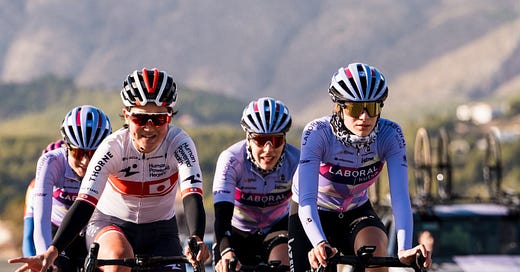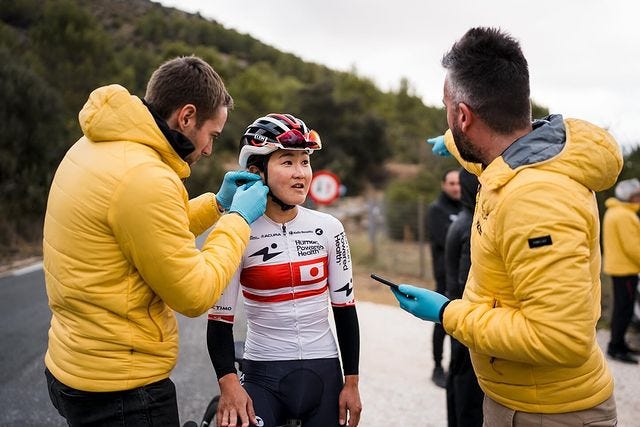Eri Yonamine Interview
Japan's only female pro talks to Global Peloton about her journey into the sport, road cycling challenges in Japan, and moving to a new team after a 'mentally hard' 2023

Eri Yonamine is part of a fairly exclusive club. She is one of only a handful of Japanese women to have made the transition to the European peloton.
Others include Miho Oki, who was third in the 2005 Trofeo Alfredo Binda, and Mayuko Hagiwara, winner of a stage of the 2015 Giro Donne. Aside from this trio, Japanese women have been few and far between at the top-level of pro cycling.
Yonamine has not yet reached the heights of her older compatriots in what is now a very different women’s peloton, but she is, undoubtedly, Japan’s current flag-bearer.
The determination to succeed
Growing up in Sakai, Yonamine was a promising tennis player in her teenage years. Feeling the urge to change sports during university, she asked her uncle for advice. He introduced her to a friend who owned a bike shop.
Yonamine was 20 when she took up cycling seriously, making her a late-starter compared to many of her European peers.
Yonamine spent her first months in cycling training with the men from her local club, meaning that she had no women to compare herself with. This turned to her advantage as she entered her first big race, the Japanese national championships.
Yonamine finished a surprising second behind Hagiwara, the Giro Donne stage winner.
Clearly, in cycling, Yonamine had found a sport to which she was naturally suited. But for Japanese women, just like in many nations outside of western Europe, opportunities to show your skills to teams are few and far between. She found that her best chance came annually at the World Championships.
“I was selected there for World Championships and I did OK for a couple years,” Yonamine told Global Peloton. “I did some not so bad results [40th 2013, 22nd 2014] and then I was in the escape group [in 2015] and then FDJ called me just after Richmond World Championships in 2016.”
Having ridden the first half of that season with the American team Hagens Berman - Supermint Pro Cycling, Yonamine joined FDJ after the Rio de Janeiro Olympics - the team was called Poitou - Charentes.Futuroscope.86 that season.
She was an instant hit in Europe, which is very rare for an Asian rider. Yonamine finished top-10 in the GC of the Tour Feminin l'Ardeche and Trophée d'Or Féminin and rode her first Giro Donne to 25th place overall in her first few weeks with the French team.
It was a whirlwind year for Yonamine, having moved almost 6000 miles west from her birthplace to a new culture, a new job, a new life. She admits that those first few months were challenging.
“It was a difficult first year. I was in a team house in France. It was very isolated, you know, like in the middle of nowhere, far away from a town and far away from a supermarket. It was hard to live there.”
It was the then 26-year-old’s resolve that saw her through that initial period, her determination to make a success of her big move. “I just focused. I wanted to be a success in Europe. So, you know, I don't care about any stress,” she said.
Since then, Yonamine has established herself as a reliable climbing domestique. Not one to take many results of her own, but a valued member of every team she has been a part of.
An uphill battle for cycling in Japan
In 2021, Yonamine had the fortune of experiencing something very few cyclists get to in their careers: racing a home Olympics.
The Tokyo Olympic Games were impacted greatly by the COVID pandemic, with crowds at most of the events greatly reduced. However, the road cycling events were not subject to such restrictions, so Yonamine feels that she still got her full home Olympic experience.
“It was amazing because the other sports like football, track and field, they had no audience, but for cycling we had a full audience on the road: start to finish. It was amazing and I didn't expect how big the audience was. It was huge.”
The Tokyo Olympics were a huge opportunity for cycling as a sport in a country where the landscape is dominated by Baseball. “Everyone can watch baseball every single day in the season, but cycling is hard to watch…cycling is not a famous sport in Japan," Yonamine said.
When she first told her friends that she was cycling all those years ago, they assumed that Yonamine was competing in the Keirin, which is something if an institution in Japan.
“In every single city, they have a Keirin stadium in Japan,” she tells me. The Keirin is central to the betting culture in Japan. Riders can make huge sums of money in the sport, which attracts young cyclists away from the road and onto the boards. “Keirin has big power in Japanese cycling, only Keirin has big power and money,” she adds.
On the face of it, professional road cycling in Japan should be ripe for growth. The country has a fairly healthy racing scene on the men’s side and big cycling businesses such as Shimano, Bridgestone and Nippo.
However, in many ways, the sport in Japan appears to be on the decline. Shimano reported a 40% loss in profits in July and Nippo have pulled out of sponsoring EF Education-Easypost’s development squad for 2024.
That development team was the only established pathway for young Japanese riders to try to make a career in Europe. All but one of the Japanese riders in the team for 2023 have had to return home for next season - the outlier being Yuhi Todome, who secured a last-minute contract with EF’s World Tour team.
As for the women, the route to Europe is just as tricky as the one that Yonamine and her predecessors trod.
“We have no opportunity to go into Europe, there’s no support, it's up to them,” Yonamine said.
The biggest annual cycling event on the Japanese calendar is the Saitama Criterium, organised by ASO and branded as a way to globalise the sport. However, Yonamine opines that it’s not an effective mechanism for growing cycling in Japan.
“It’s a big event,” she says of the November city race, “but it’s like a show. The Japanese audience like it.”
“Personally, just my opinion, they put money not in the right place. They put money to make good race, but they didn't put money to develop Japanese cyclists.”
Looking at the Criterium, the money is clearly there for Japan to have a bigger impact in the higher-levels of the sport. However, at this moment, those in charge choose to use it to pay for the world’s biggest starts to come to Saitama, rather than, for example, creating Japanese World Tour and Women’s World Tour races.
Moving on from a ‘mentally hard’ 2023
The 32-year-old looks back on 2023 with more than a hint of frustration, especially after such a promising season prior when she had finished second at the CIC-Tour Féminin Pyrénées and was in the top-20 of the Vuelta España Femenina.
“Personally last year, 2022, it was a successful year. This year I hoped to do my best, more than 2022, but I was struggling with something. I don't know what, but it just didn’t go on my plan.”
Yonamine described 2023 as a ‘mentally hard’ season, with changes in her team, Human-Powered-Health, making for a more tense environment.
“It was big changes in the inside, the team had a new director come in. The atmosphere in the team, it's more strict. You know, not always happy. It was more stressful to get UCI points for the team. It made me a bit nervous and stressed.”
Japan’s only female professional cyclist now moves on to new surroundings at Basque outfit Laboral Kutxa-Fundacion Euskadi in 2024.
She joins as one of a number of higher-profile signings, alongside the likes of Ane Santesteban and Lourdes Oyarbide. She is likely to be given more opportunities to chase her own results again in the years ahead. Leadership is not a position that she feels comes naturally to her, although she hopes to share her knowledge with the team’s younger riders.
“I'm not a person like a leader, you know? I don't say too much in the race, also in normal. I'm more quiet, but I do my job. I'm happy to work for team and also happy to work with the young girls.”
“It was good decision for me [to move on]. I also feel it's a good team for me. The level and atmosphere will be perfect for me.”
This will be the final Global Peloton of 2023. Thank you so much for reading, sharing, commenting and subscribing this year. It’s been amazing to see how this newsletter has grown over the last 10 months. Look out for much more in 2024!
If you have enjoyed Global Peloton this year, please consider becoming a paid subscriber. I plan to add more paid-subscriber-only posts in 2024.





